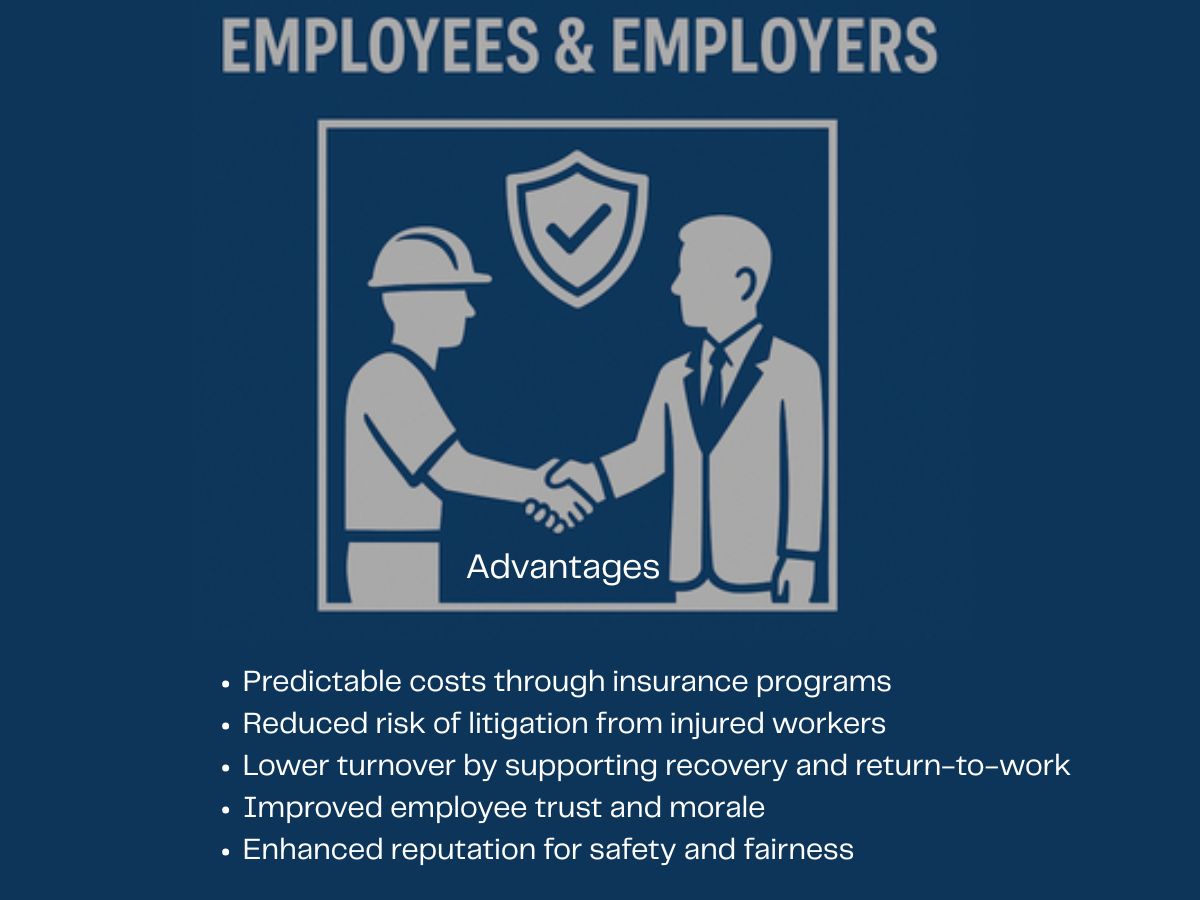How Strong Workers’ Compensation Laws Benefit Both Employees & Employers
In today’s evolving work environment, strong workers’ compensation laws are not just about protecting injured workers—they’re also vital for sustainable business operations. Whether it’s injury coverage, medical care, or return-to-work policies, these legal protections shape a safer and more stable workforce. Surprisingly to some, workers’ compensation benefits also extend to employers by minimizing disruptions and legal liabilities.
Key Components of Workers’ Compensation Laws
Workers’ compensation protections are not abstract—they have real, daily impacts on workers and business owners.
Major areas of workers’ comp coverage include:
- Medical expense coverage for job-related injuries
- Wage replacement during recovery
- Permanent disability benefits
- Vocational rehabilitation services
- Death benefits to families of deceased workers
These protections not only help injured employees heal and return to work—they also give businesses a structured, reliable system to manage injury claims and avoid costly lawsuits.
Worker Protections Drive Employee Well-Being
A visible benefit of workers’ compensation laws is how they promote employee well-being after workplace injuries. These systems guarantee that workers receive care and financial support without the burden of proving fault.
How workers’ compensation helps employees:
- Ensures medical treatment without delay
- Replaces a portion of lost income during recovery
- Offers job retraining if injuries limit previous roles
- Protects against retaliation for filing claims
- Provides peace of mind in hazardous work settings
With these guarantees, injured employees recover faster and return more confidently, improving long-term productivity.
Need Help With Workers’ Compensation Claims? Call Us Today. 205-251-9000
How Businesses Benefit from Workers’ Compensation
Though some may view it as a cost, workers’ compensation offers major advantages for employers. It establishes a clear, regulated process that protects companies from unpredictable injury lawsuits.
Employer advantages include:
- Predictable costs through insurance programs
- Reduced risk of litigation from injured workers
- Lower turnover by supporting recovery and return-to-work
- Improved employee trust and morale
- Enhanced reputation for safety and fairness
Well-structured workers’ comp programs protect your workforce and your bottom line.
Economic Benefits of Workers’ Compensation Protections
Beyond individual businesses, workers’ comp systems contribute to economic resilience. Nations and states with strong protections often see:
- Faster workforce reintegration after injuries
- Greater financial stability for families
- Lower public health system burdens
- Higher consumer confidence due to income continuity
In the U.S., these benefits ripple across the economy. When injured workers are financially protected, they maintain spending, supporting other industries and services.
Global Perspective on Workers’ Compensation Systems
Internationally, some of the world’s most developed countries operate with robust workers’ compensation laws. Countries like Germany, Australia, and Canada offer extensive injury protection while maintaining high productivity. These systems prove that injury protection laws are business enablers, not burdens.
Likewise, forward-thinking companies like Patagonia and Microsoft go beyond minimum legal requirements, offering strong return-to-work support and wellness programs—resulting in loyal, high-performing teams.
Compliance Is a Strategic Necessity
Compliance with workers’ compensation laws isn’t optional—it’s a strategic advantage. Businesses that stay ahead of regulatory changes and claims processes are:
- Better positioned to avoid costly disputes
- More agile in adjusting to workforce injuries
- Seen as responsible and ethical employers
To protect your operations, businesses should routinely review claims procedures, update workplace safety plans, and consult legal professionals on evolving workers’ compensation laws.
Workers and Employers Thrive Under Strong Compensation Laws
Ultimately, injury protections and business performance go hand in hand. When workers feel safe and supported, they are more motivated, loyal, and productive. At the same time, businesses benefit from stability and reduced legal exposure.
Integrating workers’ comp best practices into your company culture fosters resilience, accountability, and growth.
Start Protecting Your Workforce Today
At Burge & Burge, PC, we believe that strong legal protections build stronger businesses. Whether you’re navigating a workplace injury or strengthening your company’s injury policies, our experienced legal team is here to help.
Our Service Locations
Get Help With Workers’ Compensation Today
FAQs – Understanding Workers’ Compensation
1. What are the main benefits of workers’ compensation laws?
They ensure medical care, wage replacement, and job protection for injured workers while reducing employer liability and legal exposure.
2. How do workers’ comp laws impact business growth?
By providing structure and protection, they reduce litigation risks, improve employee morale, and support workforce retention.
3. Are workers’ compensation laws the same in every state?
No. While there are federal guidelines, each state has its own rules. Staying compliant with state-specific laws is essential.
4. Why should employers invest in workers’ compensation training?
It helps ensure proper claims handling, compliance, and fosters a safe and transparent workplace.



Leave a Reply
Want to join the discussion?Feel free to contribute!